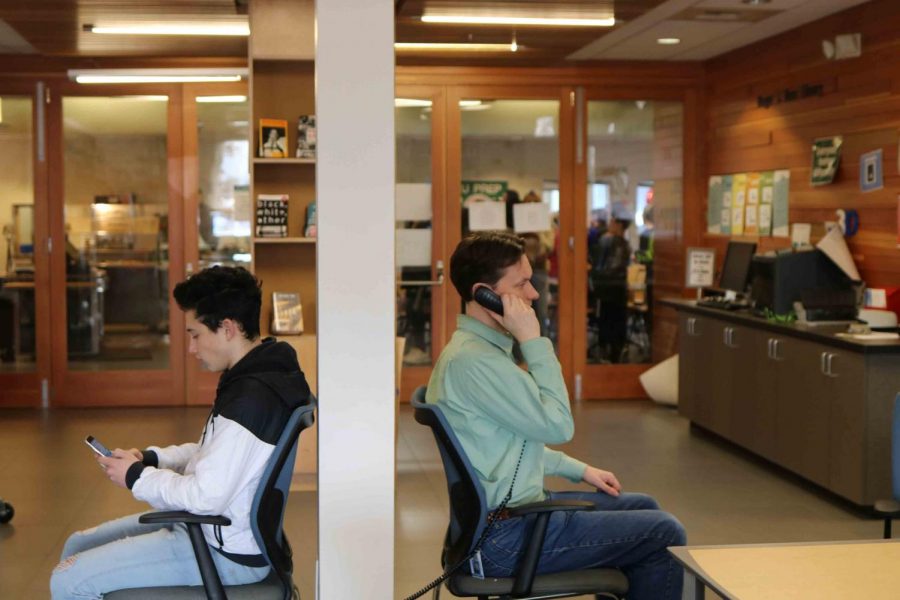Lost in Translation
Communication gaps are growing between teachers and students
Photo: Olivia Poolos
Director of Techology Jeff Tillinghast talks on a landline phone while Junior Devin Wagner texts on a cell phone. As means of commucation evolve, students and teachers of different generations struggle to connect.
In the modern-day world of LOLs, Snapchat streaks and trending Instagram posts, communication between Generation Z students and millennial-and-older teachers is evolving.
Both parties struggle with understanding slang and appropriate levels of formality in and and outside of the classroom.
Librarian Leah Griffin uses slang to connect with students.
“I like to know what’s going on in kids’ lives, what they’re interested in,” she said.
Griffin says she uses social media, such as Instagram, to stay informed about popular culture. Her current favorite slang word is “Bangerang.”
Students, however, have conflicting views on the acceptability of teachers using slang.
Senior Maddie Lafreniere has no problem with teachers trying to integrate teen language into their classrooms.
“I don’t find it strange that teachers use slang, as long as it’s not offensive to other people,” she said.
On the other hand, junior Devin Wagner is in the camp that is very opposed to teachers using slang. He finds the efforts made by teachers to seem relatable fall short and can sometimes end in embarrassment.
“It’s definitely awkward because it makes it seem like they’re trying too hard to relate to us,” Wagner said.
Along with slang, another possible communication gap comes in the form of technological communication.
A couple of teachers have noticed a trend of more casual emails, which often look more like text messages.
“A lot of times I’ll receive just one sentence email without a salutation or a signoff,” said Griffin.
Griffin admitted that, though casual electronic communication is different from what she is used to, she doesn’t think any less of a student who writes more informally.
Lafreniere is especially conscious of writing formally when addressing teachers, as she believes it be an good skill for navigation in the wider world.
“I think it’s valuable, especially in college and jobs,” she said.
Math teacher Dan Chestnut agrees that formality should be a given in interactions between students and teachers. He also believes that the culture surrounding formality at University Prep is very forgiving, even allowing explicit language in some circumstances.
“I’ve heard students swear in front of a teacher before in the course of discussion, and nothing happens,” Chestnut said.
Chestnut, however, like Griffin, does not fault the students for speaking informally. Instead, he believes that the trend at UPrep is to not condemn blatant informality.
“[Students] behave with teachers the way the school culture allows them to,” he said.
Griffin believes that formality in school is important “to an extent,” but also recognizes that with a new generation comes different forms of communication.
“It’s just different than how it was done when I was a kid,” she said.
Your donation will support the student journalists of UPrep.


